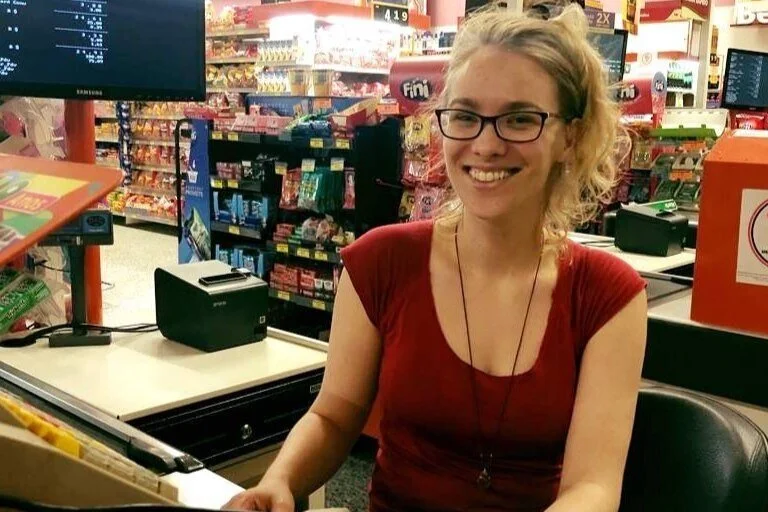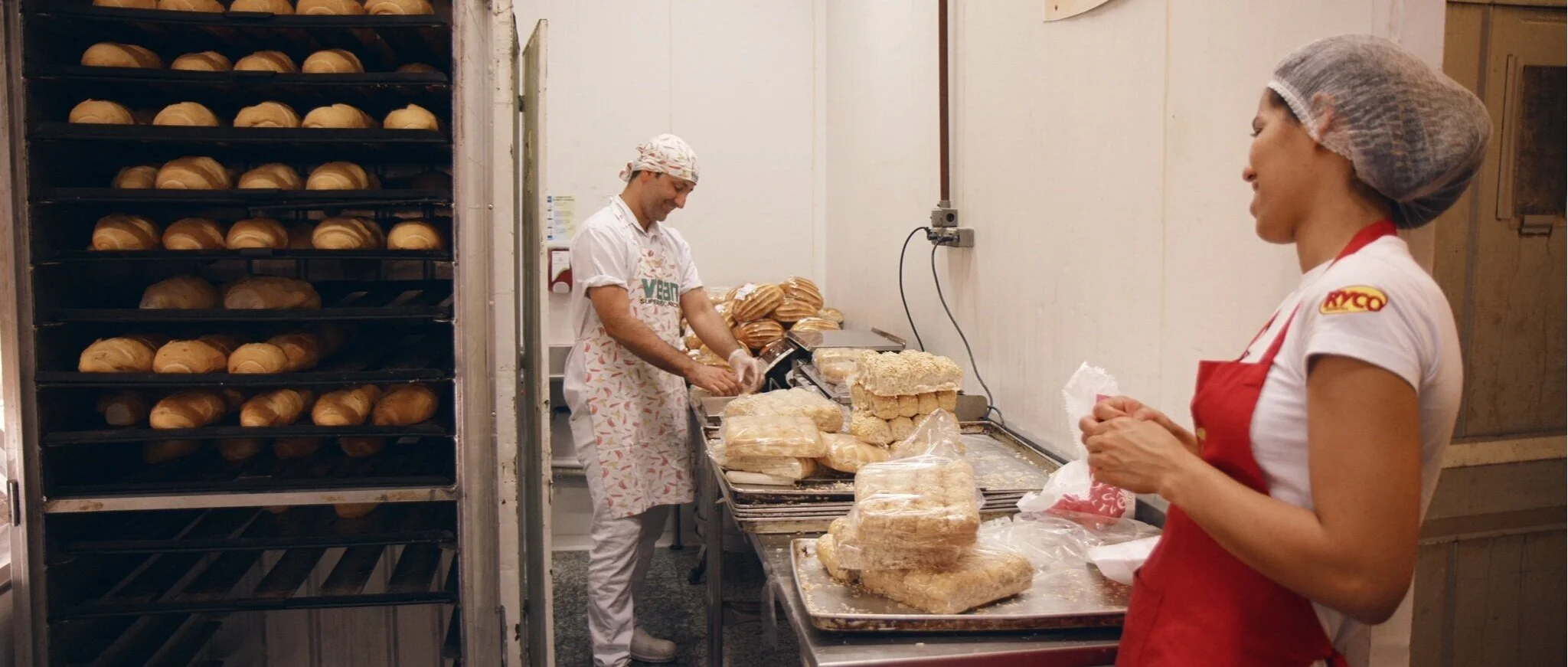By Marina Mendes Gandour
On the occasion of the virtual theatrical release of Tali Yankelevich’s debut feature film My Darling Supermarket, TropicalFRONT collaborator Marina Mendes Gandour sat down (via Zoom) with the Brazilian director to discuss the idiosyncrasies, challenges, and charms of her unconventional, and philosophical, new documentary.
To start, can you tell us a little bit more about why you chose the supermarket as your object of study?
The question of repetition is something that I was already very interested in. From 2009 to 2010, I was working on a short film called The Perfect Fit, which is mostly set in a shoe factory. It’s about men who make ballet shoes, and the ballerina who wore the shoes. It’s [also] about the two parallel universes of these characters. I really loved filming in that factory, I thought the characters there were so strong. The men were doing this really repetitive work, but there was something else in the air…it was as if, when your body is stuck in this repetitive motion, the human spirit is gone and it has to live somewhere else. So I noticed conversations, some sort of creativity that lived in the air. And I questioned myself about the best way to capture this feeling, the best way to talk about these human contradictions; of the human and the mechanical within the same frame.
Some time after this, I was shopping at a supermarket late at night, and I overheard a conversation between two workers who were really young and were organizing the cereal shelves, and they were having a passionate discussion about their first loves. It was this long supermarket corridor, so many products, so much information, and all of a sudden, these two people talking about love. That moment was very cinematographic, and it reminded me of the shoe factory and of the things that I was interested in capturing in that space. That was the moment I thought I wanted to make a film about a supermarket. But from that moment until the moment the idea arrived at the format you see in the film, it was a very long process. I spent a long time thinking about it, until I got the idea on paper, and years later it became what it is now.
In the film you have many long and intimate conversations with some of the “characters” in the supermarket. Can you tell us more about the process of developing these relationships, and of choosing which characters were going to ultimately be the protagonists?
It took a lot of research. I consider the research part of the documentary production process to be the most important one. Even when it was still on paper, this was a project in which I knew that all of the characters were really going to be important, and it was crucial that we found the right ones. So, I had the concept, which was talking about human imagination in a space filled with limitations, a space where people were doing very repetitive work. The concept for this film was essentially, “what is happening in people’s minds while they are working?”
So I started working with a researcher and we went to the supermarket and spent entire days there. We went many times and talked to many people, and did some very extensive research. When I am looking for characters, I always feel like there’s a particular chemistry that I’m looking for. When I find the right character, I have the impression that they look at me and say: “where have you been all my life? I’ve been waiting for you.” Because every human being is rich and fascinating and complex and interesting. But there’s something about the specific story that I wanted to convey, and to find characters who, in that particular moment in their life, had something very urgent and deep that they needed to communicate. It’s an exchange. So, I was looking for people who were also searching for this connection. It’s a click. When you find the right character, it’s as if they were looking for you too.
The first sign that things are going in the right direction is when you arrive on the first day of shooting and the characters are comfortable in front of the camera, which is very impressive. The people who you see in the film, when I went to film them for the first time, they had never been filmed before! They speak naturally with the camera… If someone points the camera at me I freeze, I can’t act natural at all! That’s why I say that research is so fundamental. I spent so much time doing the research, interviewing people, going to the place and spending a lot of time there. We ended up selecting twelve people, and from these twelve, five or six remained. We also have some side characters, who don’t speak in the film, but who are very interesting to observe, visually. They help to weave the narrative, the universe of the supermarket.
In this process of creating the universe of the supermarket, how much did you interfere in the narrative? Did you prompt characters to discuss certain topics, or did those conversations happen naturally?
At first, I had a concept for this project, but I didn’t know with certainty and clarity everything that would happen in the story from beginning to end. But, I had an idea that the film, the work that it was going to do, was to deconstruct the physicality of the space of the supermarket; that by the end of the film that space had to be taken over by the human, the metaphysical, the spiritual part of that supermarket. I knew that in some way there had to be some sort of break, a disruption.
My desire was to make the film’s audience forget that the documentary was set in a supermarket at all. That in being taken over by the stories and fantasies, the emotional questions being brought up, the viewer would forget that they are in a grocery store. So this was my idea for the film’s trajectory: starting in a physical world and arriving at some sort of deconstruction.
But of course, this is not the only thing that builds the narrative. It was very important for me to be constantly checking the material we were shooting, while we were shooting it. I needed to watch what I had done and be constantly thinking about the trajectory and the script of the film. I had a really good editor, who was also a good scriptwriter, who brought very important ideas into the film, so we were able to tie the narrative together. The making of this kind of film is a very engaged process — I was writing the script for it the entire time, I couldn’t let it go. I had to always be looking at what was working and what wasn’t working.
Another thing that was very important for the film concerning the narrative, since it is a film that is completely set in one location, is that it doesn’t have only one story. I did feel that it was important to include a story about at least one couple, though; I wanted the film to tell the story of a romance. In my research, I found that there were so many couples that went to work in the supermarket, because it’s a place where people spend so much time. I knew that [following at least one love story] was an element that would help bring the structure of the film together, since it’s something that the audience is hoping for — what’s going to happen with this couple?
You imagine something on paper, but when you arrive at it in reality, it is so much more complex and more beautiful than you imagined. There were characters that I had made up in my mind, but then I went out into the real world… This is why documentaries are so amazing. How could I begin to write, or even imagine, a character that sells bread in the bakery, and labels products, and at the same time, exchanges correspondence with a rabbi to understand the Jewish Kabbalah?
Or who is thinking about the origins of the universe while doing this work? I couldn’t conjure these characters, but real life presented me with them. Or even, the character who dresses as Goku and wishes that he had been born in Japan… Reality presents you with something that is much bigger than what you initially propose to yourself. This is what always reminds me with such certainty why I want to keep making documentaries. Fiction cannot create stories that are so amazing.
And finally, how does it feel for you to have My Darling Supermarket out in the world, especially in the current context? Did you come up against any challenges in getting your film to international audiences?
Well, considering that this is a film that is set entirely inside of a supermarket, and the protagonists are people who are working in this supermarket, and are not celebrities, politicians, artists…they are workers at a supermarket, I would have never imagined that one day this film would have a distribution on this scale, for it to be screened in the United States. I know it’s a smaller-scale, virtual, distribution, but even so, for an independent, low-budget film, which no one knows about, my first feature…the fact that the film is circulating the way it is I would have never expected.
It’s funny, after you finish a film, it has a life of its own; it lives in dialogue with reality, in ways that you couldn’t have predicted. For example, I finished this film in 2019, and I started to work on it in 2014. I could never have imagined that there was going to be a global pandemic, and that supermarket workers were going to become real-life heroes, on the frontlines. That people would be thinking about them and their importance. So I realized that this film is also in dialogue with this new reality, beyond the meanings that we worked with while it was still in production. I think that once the film is in the world, it acquires new meanings, and that’s what happened to my film — it has stayed in conversation with the world.
At the same time, it also talks about isolation— the documentary is about people who work in this closed environment, in a space that they can’t leave, where everyday they repeat the same actions. As a filmmaker and director, I keep learning things about my film that I didn’t know before, things that other people notice…it really is like a living being.
My Darling Supermarket is now available to stream through your favorite local theater. Check out the complete listings here. A Cinema Tropical release.








